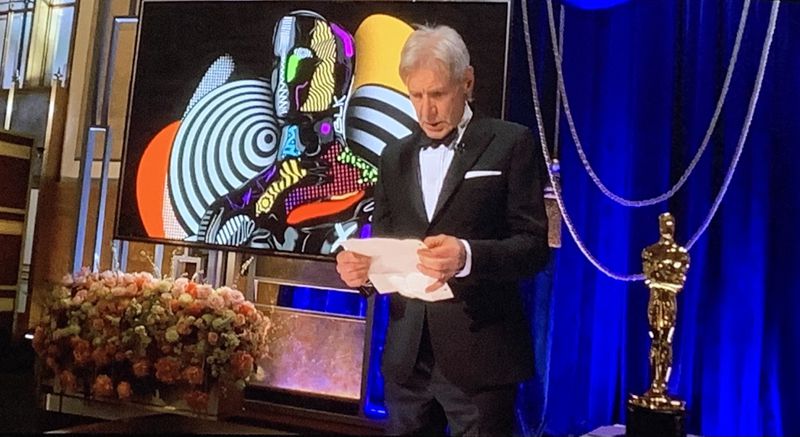by Tim Brayton

When we think of the most memorable moments in Oscar history, we tend to think about winners and their speeches, or maybe particularly impressive (or disastrous) musical or comedy performances during the ceremony itself. We don't, as a rule, tend to think about how the categories get introduced, but I find myself in the position this year of thinking that the very best, or at least the most gratifying moment in Sunday night’s telecast was exactly that. I'm talking about Harrison Ford introducing Best Editing, where we got one of those vanishingly rare moments throughout the years where this annual event designed to promote and celebrate filmmaking actually managed to promote and celebrate filmmaking.
If you've forgotten the moment, it was as unflashy as it gets: Ford, in an apparent state of, ahem "advanced relaxation," read a bunch of bullet points off of a sheet of paper...
"Too many shots of eggs". "The opening was choppy". "This movie gets worse every screening". It became pretty clear pretty quickly that these were notes from studio executives complaining about the rough cut of a movie; Ford then confirmed that he was, in fact, reading reactions to the early screenings of Blade Runner, which he starred in way back in 1982. And then he explained, briefly but clearly, that the job of a film editor is to take those notes and find ways to rearrange footage to make the film tell its story more clearly.

Hardly anything to it, and yet: when was the last time that an Oscar presenter actually told us anything specific about the craft they're about to honor? Or shared a document as nerdy and cool as the rough cut notes from Blade Runner? Year after year, when Sound Mixing and Sound Editing were two separate awards, we got annual jokes about how nobody ever knew what made those things different, but not once did the show writers try to explain that difference. Even this very ceremony, earlier in the night, Halle Berry was saddled with a "cinematography, who the heck knows what that is?" line. Taking just a moment to explain what one of the technical categories is, and why it's worth recognizing the people who do the best job of it any given year feels the kind of thing that should be a central element of every year's ceremony. And as someone who has both worked as an editor and taught editing to film students, I’m proud that this was the category where they managed to sneak this little history lesson, just this once.
And since a good editor knows when to cut away swiftly after getting the point across, that's all I have to say.